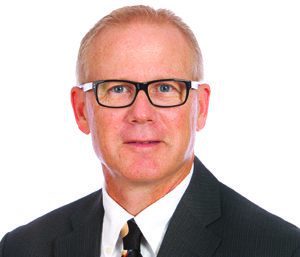
Editor’s note: Retired banker Jeff Campbell, now a financial institutions consultant at Eide Bailly, Bismarck, reflects on his career in his own voice.
How I got into banking is kind of an interesting story in that I didn’t go to school to become a banker. I was going to go into law enforcement, getting my degree in criminal justice in 1980. I had been offered a position with a police department in North Dakota. Neither my fiancé nor my folks were all that excited about my career path. Prior to accepting the position, dad asked me if I would come to work at the bank.
I thought about the chance to go back home and be a part of Security State Bank, Dunseith, N.D., the family business. My grandfather had started in the bank in the early 1930s and dad had joined him in the early 1950s. It seemed like a great opportunity so I started there in January of 1981 as a teller. Over the years I worked in all areas of the bank. When dad retired in 1994 I was promoted to president/CEO and eventually purchased controlling interest in the bank holding company.
In 1995 I had the opportunity to serve as president of the Independent Community Banks of North Dakota. The interstate/intrastate branching debate was front and center in the industry at that time. The independent bankers opposed branching as a way of protecting their charters and franchise values. During that legislative session, things changed and interstate branching was allowed. Ironically, many who were opponents of that issue now have benefited from it and expanded to other markets within the state.
I was one who took advantage of the changes and in 1996 branched into Rolla, N.D., about 20 miles east. We put another location in Bottineau, N.D., about 20 miles west, in 2008. With those locations it gave us a nice presence along Highway 5 in north central North Dakota. It can be challenging in rural areas for banks to maintain their size, even more so to grow.
One of the most challenging issues that the smaller community banks face is the onslaught of bank regulations. That continues to result in more consolidation in the industry and is the primary reason I began to think about selling. Like so many stories I hear now, it impacts not only you but your staff as well.
I started to seriously consider selling in the fall of 2010. During the winter of 2011 I talked with Craig Larson of Starion Financial, a friend of mine. We had done quite a bit of hunting together and were actually out on a winter coyote hunt when we started seriously talking about it. It was a willing seller, willing buyer situation and we were able to work very cohesively on the project. We entered into an agreement in the spring of 2011, and closed the deal in October of that year.
I stayed on as the market president for those three locations for a year. During that time I was asked to consider taking a positon in the bank as the risk officer which meant a move to the Bismarck/Mandan area. After accepting that position my wife and I moved to Bismarck in December of 2012. In June of 2014, I decided it was time to do something else.
I reached out to Eide Bailly to see if they might have any clients that I would be a good fit for and also who would be a good fit for me. Eide Bailly had done Security State Bank’s tax and audit work and we also had used their compliance training program. It was during those discussions that the idea of me going to work for them came up. We talked about it from the standpoint that it might make sense to bring a banker on board to provide a perspective that they maybe didn’t have.
Having been in the industry almost 34 years, I understand the challenges that the community banking industry faces. That’s our primary focus at Eide Bailly – the community bank. Some of the biggest issues are and will continue to be bank regulations. The bankers I’m meeting today as a consultant are asking the same questions that I was asking myself in 2011. Community banking is very rewarding. Finding solutions and helping people and small businesses in your communities be successful is very gratifying. Unfortunately, many of the banking regulations result in a one size fits all system which continues to put tremendous burden on small town banks.
I still think of myself as a community banker. And I admire those who own and operate small banks in rural communities that continue to find ways of keeping their main streets and farms and ranches going. Those small towns and the banks in those communities play an important role in North Dakota and across the country.
I do miss the interaction with the customers of my bank. I also miss the relationships I developed with my staff, people I spent as much time with as I did with my family. You get to know them and their families and they are important to you. Now my customers are bankers. I look forward to finding ways of helping them be successful, just as I did my bank customers.
